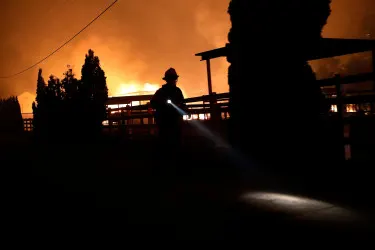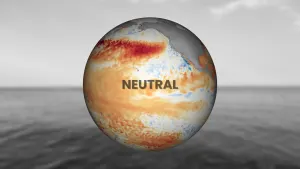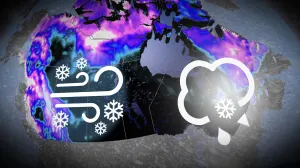
Fast-moving Los Angeles wildfire destroys homes, prompts evacuation orders
(Reuters) - Thousands of people in Los Angeles were ordered to evacuate after a fast-moving brush fire ignited early on Monday morning near the Getty Center museum, the latest outbreak in a wildfire season that has scorched parts of California.
The fire broke out around 1:30 a.m. (0830 GMT) and has since grown to consume more than 500 acres (202 hectares) in the scrub-covered hills around Interstate 405, near some of the city's most expensive homes. Commuters posted videos of slopes aglow with orange flames close to the road's edge.
At least five homes had burned down but there were no reported injuries, Mayor Eric Garcetti told reporters at a news conference with fire officials, warning that he expected the number to rise.

A firefighter pulls a hose along Chalk Hill Road as he battles the wind-driven Kincade Fire in Windsor, California, U.S. October 27, 2019. REUTERS/Stephen Lam
"This is a fire that quickly spread," he said, urging residents in the evacuation zone, which encompasses more than 3,300 homes, to get out quickly.
Los Angeles Lakers star LeBron James, who lives in the area, said he had heeded the warning and had been driving around before dawn with his family looking for shelter.
"Finally found a place to accommodate us!" he wrote a short time later on Twitter. "Crazy night man!"
Officials at the Getty art museum said the fire was burning to the north of the building, which was designed with thick stone walls to prevent fire from damaging its treasures.
The fierce winds fanning wildfires elsewhere in the state, including a large fire consuming parts of the picturesque wine country north of San Francisco, were expected to abate on Monday.
But forecasters with the National Weather Service said high winds would return later in the week and could be the strongest so far this year in the south of the state.
Marc Chenard, a forecaster with the NWS's Weather Prediction Center, said wind gusts in northern California would abate by midday and in the south of the state by later in the afternoon.

A firefighter runs along a dirt road during the wind-driven Kincade Fire in Windsor, California, U.S. October 27, 2019. REUTERS/Stephen Lam
Wind gusts can be between 50 to 60 miles per hour (80-96 kph), with some significantly higher, he said.
The northern California wine country has borne the brunt of the fires, with 84 square miles (218 sq km) burned and 190,000 people evacuated in the Kincade fire.
Only about 5% of that fire was contained early on Monday after crews lost ground against the wind-driven wildfire a day earlier.
About 3,000 people were battling the Kincade Fire, the worst of more than a dozen major blazes that have damaged or destroyed nearly 400 structures and prompted Governor Gavin Newsom to declare a statewide emergency.
Investigators have not yet said what they believed caused the blaze, although it ignited near a broken wire on a Pacific Gas & Electric transmission tower.
POWER OUTAGES
More than a million homes and businesses were without power on Monday morning, most of those from planned outages. Forecasts of high winds had prompted PG&E to shut off power to 940,000 customers in 43 counties on Saturday night to guard against the risk of touching off wildfires.
PG&E expects to issue a weather all clear for safety inspections and restoration work to begin early Monday morning for the northern Sierras and North Coast, the company said.
The governor has been sharply critical of PG&E, saying corporate greed and mismanagement kept it from upgrading its infrastructure while wildfire hazards have steadily worsened over the past decade.

A burning structure is seen during the wind-driven Kincade Fire in Windsor, California, U.S. October 27, 2019. REUTERS/Stephen Lam
PG&E filed for bankruptcy in January, citing billions of dollars in civil liabilities from deadly wildfires sparked by its equipment in 2017 and 2018.
(Reporting by Stephen Lam in Healdsburg, California, additional reporting by Jonathan Allen in New York and Rich McKay in Atlanta; Editing by Scott Malone, Steve Orlofsky and Bill Berkrot)









